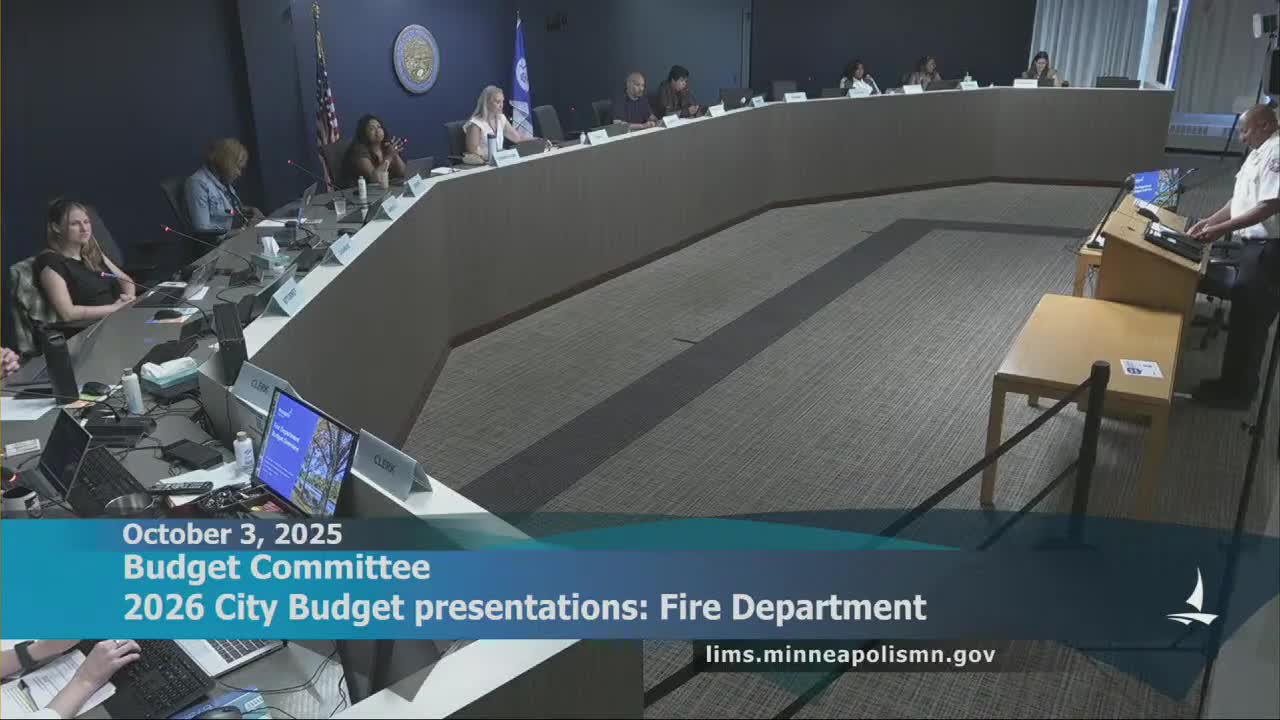Fire chief: response-time gains, SAFER grant timeline and targeted cuts to support services
October 04, 2025 | Minneapolis City, Hennepin County, Minnesota
This article was created by AI summarizing key points discussed. AI makes mistakes, so for full details and context, please refer to the video of the full meeting. Please report any errors so we can fix them. Report an error »

Chief Brian Tyner presented the Minneapolis Fire Department’s 2026 budget overview to the Budget Committee on Oct. 3 and outlined performance priorities, staffing needs and proposed spending reductions.
“Our goal is we are committed to preventing the fires by proactively working with the community to reduce the risk to life, property, and the environment,” Tyner said, summarizing the department’s mission and its recent additions, including a behavioral crisis response (BCR) contract and expansion of the Omari Safe Station opioid recovery program.
Nut graf: The department reported recent gains on response times but said it remains short of the NFPA 1710 target. The SAFER grant funded 15 firefighter positions and runs through March 31, 2026; the department plans to absorb those positions into the general fund after that date. To meet budget reduction targets the 2026 mayoral recommendation removes about $129,000 in contractual services (including the Lexipol app and the Ready Rebound injury-management program) and eliminates one vacant office support position.
Tyner described response-time measurement as beginning when 911 answers a call and said the department reached a roughly 70% rate this year for the metric of first rig arriving within five minutes. The department’s 2026 target is 90%. Tyner said a new station alerting system, which will route calls directly from 911 to stations and cut a dispatch step, is expected to save about 30 seconds per run and help improve measured response times; installation is planned in tiers with funding spread across multiple years.
On staffing, Tyner said the SAFER grant added 15 FTEs and that those positions are scheduled to transition to the general fund in March 2026. He estimated the department still needs approximately 45 additional positions to reach a staffing level that would eliminate routine overtime pressure and allow a regular four-person engine staffing model. Tyner estimated the cost of adding roughly 45 positions at about $4.4–$4.7 million, an amount he said is comparable to what the city currently pays in overtime to maintain minimum staffing.
Regarding proposed cuts, Tyner said Lexipol — a mental-health and resiliency app for members — and Ready Rebound — an injury concierge service that expedites medical care and rehabilitation — are among the contracts slated for elimination to meet the reduction target. He warned that removing Ready Rebound would likely lengthen recovery time for injured members and could increase overtime costs because workers’ comp and slower processes would take longer to return employees to full duty.
Committee members asked about recruitment, the MFDEMS Pathways Academy and long-term plans for staffing; Tyner said the department’s recruiting and training pipeline has strengthened but that SAFER grant rules and federal changes have complicated reapplication timing. The clerk filed the presentation for the record.
“Our goal is we are committed to preventing the fires by proactively working with the community to reduce the risk to life, property, and the environment,” Tyner said, summarizing the department’s mission and its recent additions, including a behavioral crisis response (BCR) contract and expansion of the Omari Safe Station opioid recovery program.
Nut graf: The department reported recent gains on response times but said it remains short of the NFPA 1710 target. The SAFER grant funded 15 firefighter positions and runs through March 31, 2026; the department plans to absorb those positions into the general fund after that date. To meet budget reduction targets the 2026 mayoral recommendation removes about $129,000 in contractual services (including the Lexipol app and the Ready Rebound injury-management program) and eliminates one vacant office support position.
Tyner described response-time measurement as beginning when 911 answers a call and said the department reached a roughly 70% rate this year for the metric of first rig arriving within five minutes. The department’s 2026 target is 90%. Tyner said a new station alerting system, which will route calls directly from 911 to stations and cut a dispatch step, is expected to save about 30 seconds per run and help improve measured response times; installation is planned in tiers with funding spread across multiple years.
On staffing, Tyner said the SAFER grant added 15 FTEs and that those positions are scheduled to transition to the general fund in March 2026. He estimated the department still needs approximately 45 additional positions to reach a staffing level that would eliminate routine overtime pressure and allow a regular four-person engine staffing model. Tyner estimated the cost of adding roughly 45 positions at about $4.4–$4.7 million, an amount he said is comparable to what the city currently pays in overtime to maintain minimum staffing.
Regarding proposed cuts, Tyner said Lexipol — a mental-health and resiliency app for members — and Ready Rebound — an injury concierge service that expedites medical care and rehabilitation — are among the contracts slated for elimination to meet the reduction target. He warned that removing Ready Rebound would likely lengthen recovery time for injured members and could increase overtime costs because workers’ comp and slower processes would take longer to return employees to full duty.
Committee members asked about recruitment, the MFDEMS Pathways Academy and long-term plans for staffing; Tyner said the department’s recruiting and training pipeline has strengthened but that SAFER grant rules and federal changes have complicated reapplication timing. The clerk filed the presentation for the record.
View full meeting
This article is based on a recent meeting—watch the full video and explore the complete transcript for deeper insights into the discussion.
View full meeting
